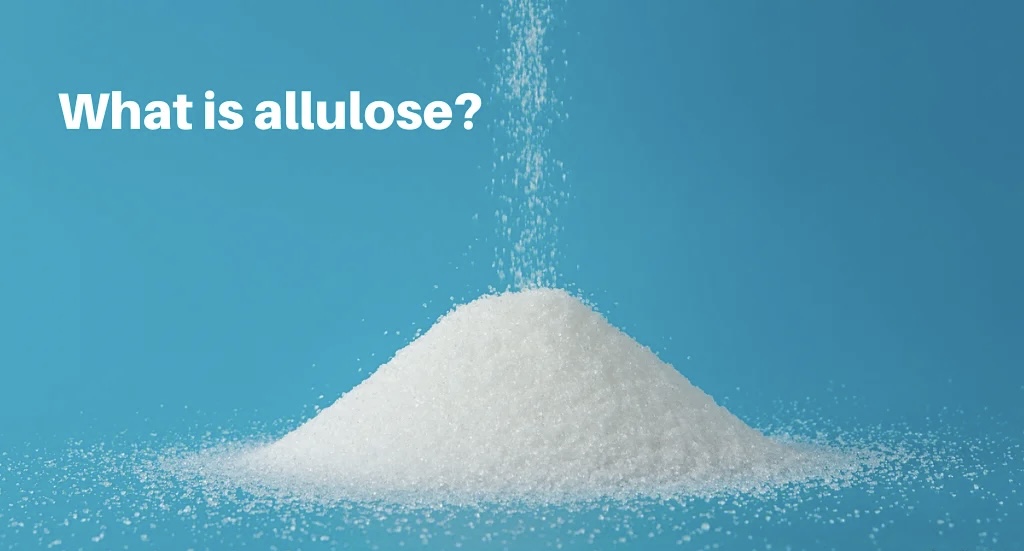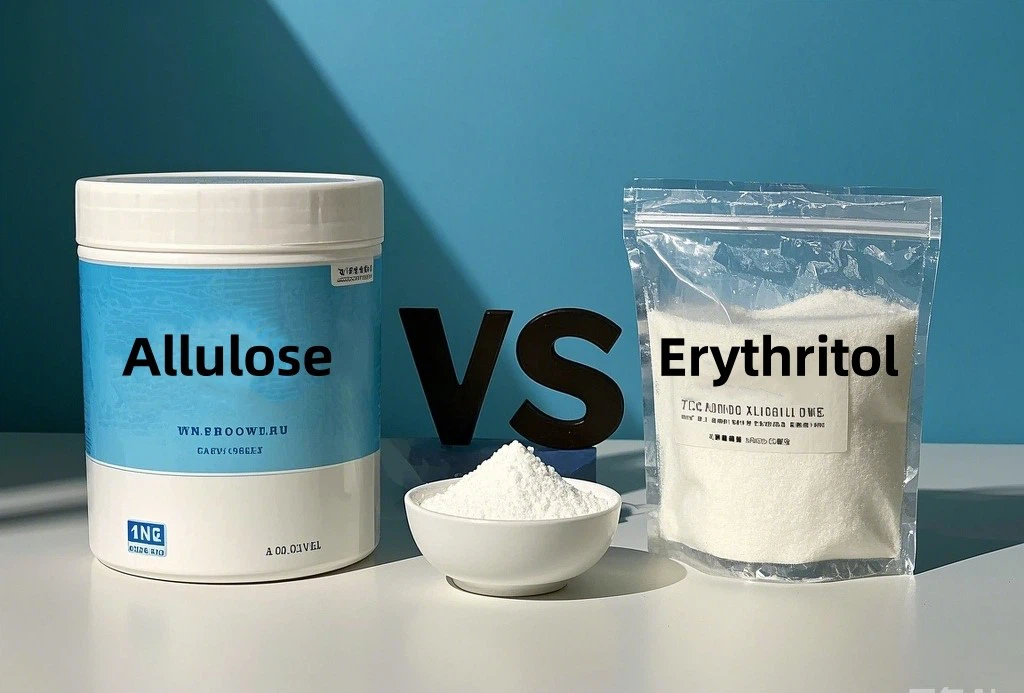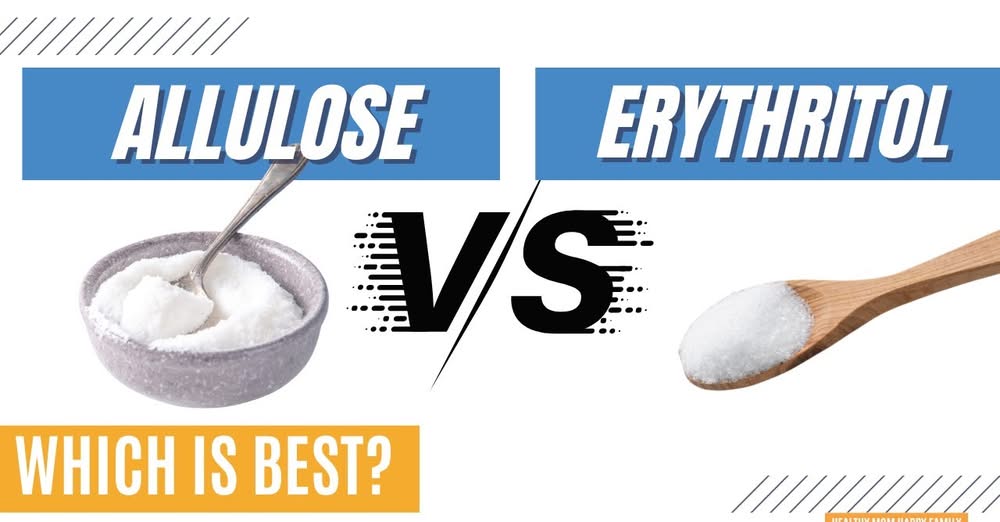If you’re like most people, you may want to reduce added sugar in your diet, but you don’t know if artificial sweeteners are good for you either. As a dietitian and diabetes educator, I am here to break down two popular sugar substitutes: allulose vs erythritol.
Choosing the right sugar substitute can be challenging with so many options available. Both allulose vs erythritol are low-calorie sweeteners that are popular for low-carb or keto diets, but they have differences.
Whether you’re managing your blood sugar, or just doing some personal research, let’s break down the key features of allulose vs erythritol to help you make the best choice for your needs.
What is Allulose?

Allulose, a rare monosaccharide found in fruits like figs, is a new sweetener with some interesting benefits. Discovered a couple of decades ago, it’s become popular because it’s very low in calories, about 90% less than regular sugar. This makes allulose a great option for people watching their weight or managing their blood sugar.
Allulose also doesn’t have much impact on blood sugar levels because your body doesn’t fully metabolize it. This makes it a good choice for people managing their glycemic response. Plus, allulose enhances the texture and mouthfeel of food, giving it a satisfyingly sweet taste without the downsides of sugar. As the demand for healthier choices of sweetener alternatives grows, allulose stands out as a promising option. It’s a natural, low-calorie alternative that adds sweetness to food without the net carbs and extra calories.
Allulose’s Nutrition
- Low in calories: Contains only about 0.4 calories per gram, compared to 4 calories per gram for sugar.
- Zero net carbs: Allulose is not fully absorbed by the body, meaning it doesn’t count toward net carbohydrate intake.
- Doesn’t raise blood sugar: Allulose has minimal impact on blood glucose and insulin, making it ideal for people with diabetes.
- Non-glycemic: It doesn’t spike blood sugar levels, making it safe for those managing blood sugar or following a low-carb diet.
What is Erythritol?

Erythritol, a popular sugar substitute, is gaining traction in the wellness world for its unique qualities. It’s naturally found in small amounts in fruits like grapes and melons, but it’s mostly made through a corn fermentation process. With approximately 70% of the sweetness of sucrose (table sugar), erythritol distinguishes itself by delivering sweetness without caloric burden.
This makes it a remarkable solution for wellness-focused people who are managing their glycemic response. It’s non-glycemic, easy to digest, and won’t harm your teeth. That’s why it’s become a top choice for those looking to cut calories and sugar without sacrificing sweetness.
Erythritol’s Nutrition
- Low in calories: Contains about 0.24 calories per gram, much lower than regular sugar.
- Zero net carbs: Like allulose, erythritol is not fully absorbed by the body, so it doesn’t contribute to net carbs.
- Doesn’t raise blood sugar: Erythritol has a negligible effect on blood glucose and insulin, making it suitable for people with diabetes.
- Non-glycemic: It doesn’t impact blood sugar levels and is commonly used in keto and low-carb diets.
Allulose vs Erythritol: Nutrition Differences
Both allulose vs erythritol are popular for their low-calorie content, but they have different nutritional profiles:
- Calorie content: Allulose has about 0.4 calories per gram, whereas erythritol has 0.24 calories per gram. Both are significantly lower in calories compared to regular sugar, thought erythritol is the lowest.
- Blood Sugar: Both sweeteners have minimal impact on blood sugar levels, making them suitable for people with diabetes. However, erythritol is absorbed into the bloodstream but not metabolized, so it has zero glycemic impact.
- Sweetness: Both are around 70% as sweet as sugar, which means you may need to use a bit more than you would with regular sugar to achieve the desired sweetness. However, when cooking, allulose can be subbed for sugar at a cup-for-cup ratio.
Allulose vs Erythritol: Differences

To navigate this sugar-free terrain effectively, let’s cover the key distinctions between allulose vs erythritol, examining factors such as caloric content, origins, metabolic impact, taste, and culinary applications. This information will empower you to make informed choices that align with your dietary preferences and wellness goals.
Caloric Content
Allulose
While allulose provides sweetness similar to traditional sugar, it contributes minimal calories to the diet, containing approximately 90% fewer calories than sucrose.
Erythritol
Erythritol has almost zero calories, making it an attractive option for those looking to reduce calorie intake while still enjoying sweetness.
Origins and Natural Occurrence
Allulose
Naturally occurs in small quantities in certain fruits like figs and raisins, and it can also be commercially produced from sources like corn.
Erythritol
Naturally found in small amounts in some fruits, but commercially produced through the fermentation of glucose, often sourced from corn. Pyure’s erythritol is sourced from Non-GMO corn specifically and is an organic product.
Metabolism and Blood Sugar Impact
Allulose
Absorbed by the body but not metabolized, allulose is suitable for those opting for low glycemic index sweeteners.
Erythritol
Virtually non-glycemic and does not raise blood sugar levels, making it a great choice for those on keto or low glycemic index diets.
Taste and Mouthfeel
Allulose
Provides a sweetness similar to sucrose with no noticeable aftertaste making it an appealing choice for people. Additionally, it contributes to the texture and mouthfeel of foods, mimicking the characteristics of sugar.
Erythritol
Can have a cooling sensation on the palate and a slight aftertaste, which varies among individuals. Its granulated form is often used as a sugar substitute in baking.
Sugar Alcohol or Rare Sugar
Allulose
Allulose is classified as a rare sugar rather than a sugar alcohol. It has a chemical structure similar to fructose, which allows it to provide sweetness with very low caloric impact.
Erythritol
Erythritol is a sugar alcohol, meaning it is a carbohydrate that partially resembles sugar and alcohol in structure.
Cooking and Baking with Allulose vs Erythritol

Allulose vs erythritol both stand out in the culinary realm. Allulose, with its remarkable ability to mimic the moisture and sweetness of sucrose, takes center stage in the world of baked goods. It seamlessly integrates into recipes, delivering a desirable texture without excess calories. However, when crafting confections with allulose, a keen eye is essential as its browning properties may differ slightly from sugar, requiring attentive monitoring during the baking process.
On the other hand, erythritol, with its granulated form, reigns supreme as a baking staple, renowned for its ability to replicate the structure and texture of sugar. Yet, bakers should be mindful of erythritol’s cooling effect, which can subtly influence the overall taste profile of certain recipes.
In the realm of cooking, both allulose vs erythritol seamlessly blend into sauces and dressings, providing a low-calorie alternative without compromising flavor. When embarking on culinary experiments with these sweeteners, it’s advisable to start with small quantities, gradually adjusting to personal taste preferences. Additionally, combining these sweeteners with other low-calorie options or traditional sugar substitutes can yield a well-rounded flavor profile.
In essence, allulose vs erythritol empower home cooks to indulge their sweet tooth without sacrificing taste, ushering in a new era of culinary delights. With these sweeteners as their companions, home cooks can embark on a journey of culinary creativity, crafting delectable treats that are both lower calorie and satisfying (check out our Monk Fruit vs Stevia article for more sugar free sweetener details).
Which is Healthier: Allulose vs Erythritol?
Both allulose vs erythritol are excellent alternatives to sugar, especially for those looking to manage their sugar intake. Here’s a closer look:
- Allulose provides a taste and texture similar to sugar, making it ideal for baking and cooking. It has a minimal impact on blood sugar and contains fewer calories than sugar. However, it might cause digestive discomfort if consumed in large amounts.
- Erythritol contains low calories and has no impact on blood sugar, making it a great option for those who monitor their blood sugar. But sugar alcohols can or worsen digestive issues. Though erythritol is less likely to cause digestive issues than other sugar alcohols, some people may still experience mild discomfort.
Potential Downsides of Allulose
While allulose has many benefits, there are a few potential downsides to consider:
- Digestion: Consuming large amounts of allulose may lead to digestive issues such as bloating, gas, or diarrhea, especially in those with sensitive stomachs.
- Cost: Allulose tends to be more expensive than other sweeteners like erythritol.
- Availability: It may not be as widely available in stores as erythritol or other common sweeteners.
Potential Downsides of Erythritol
Erythritol is a popular choice, but it’s not without its drawbacks:
- Digestive Tolerance: Although erythritol is generally well-tolerated, consuming large amounts may cause digestive discomfort, such as bloating or a laxative effect, particularly in sensitive individuals. If you already have digestive concerns, proceed with caution to prevent negative GI symptoms.
- Cooling Effect: Erythritol can have a minty, cooling effect on the tongue when consumed in large amounts, which some people find off-putting in certain recipes. Erythritol absorbs heat while it melts, contributing to a minty-fresh sensation after eating.
Allulose vs Erythritol: Which Is Better for Diabetes?
For people with diabetes, both allulose and erythritol are excellent options because they do not raise blood sugar levels. Allulose closely mimics the taste and texture of sugar, making it easier for those transitioning away from sugar to adjust their recipes without compromising on taste.
Erythritol provides a virtually calorie-free option that is also suitable for baking and cooking, especially in low-carb and keto-friendly recipes. Both are safe choices for diabetics, and choosing between them depends on personal preference and how you plan to use them.
Which sweetener is right for you, Allulose vs Erythritol ?
Choosing between allulose vs erythritol depends on your preferences, diet goals, and cooking needs. Allulose works well for mimicking sugar’s texture, making it great for baking without spiking blood sugar levels. Erythritol is versatile and has almost no calories, making it popular in different recipes, but some might not like its cooling effect. Additionally, erythritol can be more available and cost-effective, making it a practical choice for those on a budget.
Pyure, a trusted brand of both keto sweeteners, offers the option to try their Pyure Organic Allulose Sweetener or Pyure Organic Erythritol sweetened products. Or, for those seeking a customized sweetness, experiment with a combination of both, creating a balanced and satisfying solution tailored to your personal taste and dietary preferences.
Allulose vs erythritol are both excellent low-carb sugar substitutes. Allulose is good for inflammation and erythritol improves dental health, and both have properties that are very similar to sugar, which makes them easy substitutes in baking and cooking.
Which sweetener is best depends on your personal preferences. A small number of people report mild bloating or gastrointestinal distress when eating allulose or erythritol; you may find that one or the other agrees with you more.
Takeaway of Allulose vs Erythritol
If you’re looking for a healthy sugar substitute, both sweeteners can work. Experiment to find which one you like best. Allulose has a softer, more balanced flavor that works well in cup-for-cup substitutions. Erythritol won’t raise your blood sugar and is lower in calories than allulose, but may cause digestive upset.
Our Hangzhou Health Sweet Biotech Corporation is a professional food ingredients supplier from 2010, especially expert in Food sweeteners. Allulose vs Erythritol is our main and strong products.

